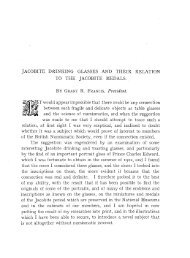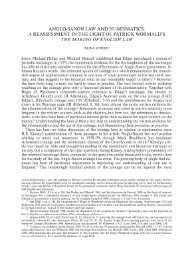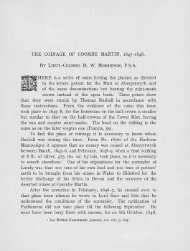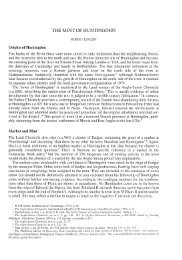a re-examination of a gold medal awarded to major rogers for ...
a re-examination of a gold medal awarded to major rogers for ...
a re-examination of a gold medal awarded to major rogers for ...
You also want an ePaper? Increase the reach of your titles
YUMPU automatically turns print PDFs into web optimized ePapers that Google loves.
MAJOR ROGERS FOR VALOROUS SERVICES IN 1690 149<br />
Thomas and William we<strong>re</strong> among the signa<strong>to</strong>ries <strong>of</strong> the Londonderry Corporation <strong>of</strong><br />
1690. Robert Rogers was an <strong>of</strong>ficer in Colonel Hugh Hamill's Regiment <strong>of</strong> Foot during<br />
the siege <strong>of</strong> Londonderry and after the <strong>re</strong>lief went <strong>to</strong> London <strong>to</strong> attempt <strong>to</strong> obtain<br />
ar<strong>re</strong>ars <strong>of</strong> pay due <strong>to</strong> the survivors <strong>of</strong> the siege. While the<strong>re</strong> he was given £45, th<strong>re</strong>e<br />
months' pay, <strong>to</strong> enable him <strong>to</strong> <strong>re</strong>turn <strong>to</strong> the Duke <strong>of</strong> Schomberg's camp in I<strong>re</strong>land. The<strong>re</strong><br />
is no <strong>re</strong>cord <strong>of</strong> his p<strong>re</strong>sence at the Battle <strong>of</strong> the Boyne and he spent the <strong>re</strong>st <strong>of</strong> his life,<br />
unsuccessfully, in trying <strong>to</strong> extract money from the War Office <strong>of</strong> those days, and after<br />
his death his brothers under<strong>to</strong>ok the task, again unsuccessfully.<br />
The next <strong>re</strong>fe<strong>re</strong>nce <strong>to</strong> an <strong>of</strong>ficer named Rogers occurs in 1691 when a Samuel Rogers<br />
was appointed Lieutenant <strong>to</strong> Captain Rogers in Colonel Edward Villier's Regiment <strong>of</strong><br />
Horse. As this <strong>re</strong>giment, later I believe the 2nd Dragoon Guards, had no connexion with<br />
Enniskillen it may be igno<strong>re</strong>d.<br />
Also in 1691, on the 3 Oc<strong>to</strong>ber, Abr. Rogers was appointed Captain vice Jno. Symonds<br />
in Viscount Castle<strong>to</strong>n's Regiment <strong>of</strong> Foot. This Rogers must have served in<br />
Tiffin's Regiment <strong>of</strong> Foot as the list <strong>of</strong> <strong>of</strong>ficers <strong>of</strong> Colonel Zachariah Tiffin's Regiment<br />
<strong>of</strong> Foot in Flanders in 1694 contains the name Jno. Symonds as Captain Lieutenant. The<br />
futu<strong>re</strong> ca<strong>re</strong>er <strong>of</strong> Rogers is <strong>re</strong>adily traced as in 1694 he was Adjutant <strong>of</strong> Colonel Luke<br />
Lilling<strong>to</strong>n's Regiment <strong>of</strong> Foot, designed <strong>for</strong> Jamaica, and an <strong>of</strong>ficer <strong>of</strong> this name was<br />
appointed 1st Lieutenant <strong>of</strong> G<strong>re</strong>nadiers <strong>to</strong> Viscount Charlemont's Regiment <strong>of</strong> Foot<br />
on 28 June 1701. The<strong>re</strong> is no further trace in the Army Lists.<br />
If this then be the <strong>of</strong>ficer named Rogers on the <strong>medal</strong> under consideration we a<strong>re</strong> left<br />
with the problem <strong>of</strong> (I) his antecedents and (II) how he could have been a Major in 1690<br />
if the following year he exchanged with a Captain in another <strong>re</strong>giment. As the second<br />
point will take little time <strong>to</strong> explain we will consider it first. The<strong>re</strong> a<strong>re</strong> two possibilities<br />
(a) that Rogers succeeded <strong>to</strong> the rank <strong>of</strong> Major during the battle due <strong>to</strong> casualties among<br />
senior <strong>of</strong>ficers. This can be immediately discounted by the fact that Tiffin's Regiment <strong>of</strong><br />
Foot sustained negligible casualties and certainly if a Major, one <strong>of</strong> the most senior<br />
<strong>of</strong>ficers <strong>of</strong> the <strong>re</strong>giment, had been either killed or wounded it would have been thought<br />
worthy <strong>of</strong> <strong>re</strong>cord. The second possibility (b) is that perhaps <strong>to</strong> avoid service abroad<br />
Rogers may have exchanged in<strong>to</strong> a <strong>re</strong>giment on a home station. Some <strong>of</strong>ficers <strong>to</strong> avoid<br />
service in an unhealthy climate would be quite willing <strong>to</strong> sur<strong>re</strong>nder some <strong>of</strong> their seniority<br />
by exchanging with a mo<strong>re</strong> junior <strong>of</strong>ficer. The station above all others <strong>to</strong> be avoided was<br />
the West Indies, whe<strong>re</strong> disease could and did wipe out complete <strong>re</strong>giments. The 18th<br />
Foot served in the West Indies from 1805 <strong>to</strong> 1817 and buried the<strong>re</strong> 52 <strong>of</strong>ficers and 1,777<br />
other ranks, without having seen any active service at all. This explanation <strong>of</strong> an exchange<br />
<strong>to</strong> avoid fo<strong>re</strong>ign service falls through when it is seen from the above extracts that<br />
this Rogers was willing <strong>to</strong> proceed <strong>to</strong> Jamaica, and su<strong>re</strong>ly the<strong>re</strong> was a better chance <strong>of</strong><br />
survival on the battlefields <strong>of</strong> Flanders than in the fever hospitals <strong>of</strong> Kings<strong>to</strong>n.<br />
Returning <strong>to</strong> the antecedents <strong>of</strong> this <strong>of</strong>ficer we a<strong>re</strong> faced with a blank. The<strong>re</strong> is no<br />
<strong>re</strong>fe<strong>re</strong>nce <strong>to</strong> him in either Hamil<strong>to</strong>n's or M'Carmick's account <strong>of</strong> the defence <strong>of</strong> Enniskillen,<br />
nor does his name appear either among those whose property was attainted by<br />
James <strong>for</strong> <strong>re</strong>bellion or among those who signed an add<strong>re</strong>ss <strong>of</strong> loyalty <strong>to</strong> William III from<br />
the citizens <strong>of</strong> Enniskillen. These a<strong>re</strong> important points as, had he been a man <strong>of</strong> property<br />
at all, he would have appea<strong>re</strong>d in the first and, without property, he would scarcely have<br />
<strong>re</strong>ceived an <strong>of</strong>ficer's commission. The possibility that <strong>re</strong>ligious conviction p<strong>re</strong>vented his<br />
signing the add<strong>re</strong>ss <strong>of</strong> loyalty is made mo<strong>re</strong> likely by the fact that Wood-Martin states



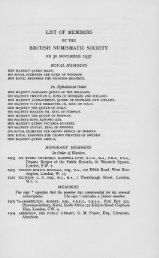
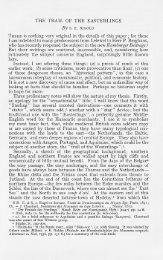
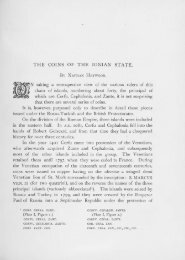
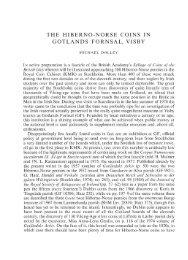
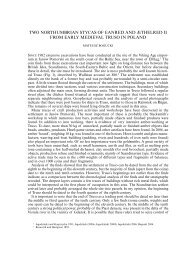

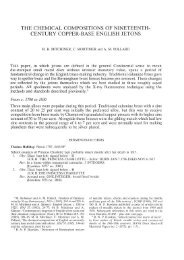
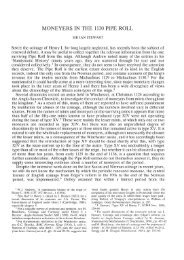
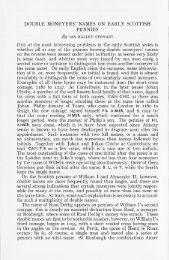
![Two Anglo-Saxon notes: [1] A Cnut die-link between the mints of ...](https://img.yumpu.com/15433998/1/189x260/two-anglo-saxon-notes-1-a-cnut-die-link-between-the-mints-of-.jpg?quality=85)
